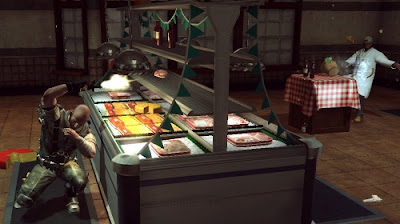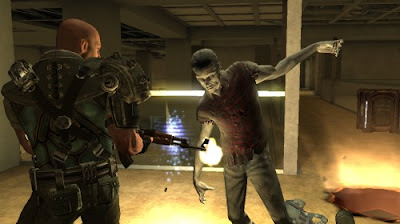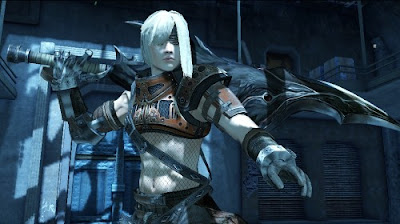Friday, December 31, 2010
End of the Line
According to Blogger I've written 55 posts (not including this one) in the 18 months since I started, and I like to think that some of them have been quite entertaining. I want to say thank you to everyone who has been reading the posts. It's been fun, and maybe at some point I'll be able to get back to it.
Thursday, December 30, 2010
Gray Matter
It seems, however, that if Duke Nukem Forever will actually be released, then nothing is impossible, and Gray Matter is on track to release on February 2011, on the PC and Xbox 360 (it is interesting to note that the 360 seems to be receiving a lot of games from small European publishers in the same way the PS2 benefited from the then-prolific Japanese industry). What's more, there is a demo available now on Live (in the European region).
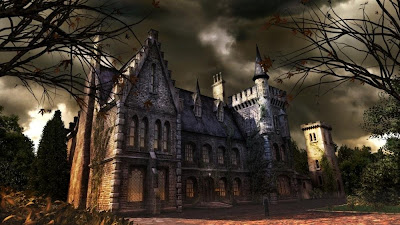
I downloaded the demo and played through it, and the most striking thing is just how much it feels like an old school graphic adventure. I was worried about how modern shiny 3D graphics would suit a game like this, but it uses 3D characters on hand-drawn backgrounds (necessitating fixed camera angles), which really works well on a large, high definition display.
The game design also feels more like that of a past era. The Telltale adventure games, while amusing, were not particularly challenging and for the vast majority of the game you knew exactly what you had to do next, where you would get the required object and what you would do with it. In the demo for Gray Matter, there was a more inference and less outright instruction, which makes you feel more like you're solving the mystery yourself, but would open up the risk of being stuck not knowing what to do next. I guess you can't have it both ways, but I managed to get through the demo without having to resort to online assistance.

Of course, nobody played graphic adventures for the item combination puzzles or the wondering as to who they need to talk to next, they play them for the plot (or the jokes, depending on the game), and Gray Matter definitely has a similar feel to a Gabriel Knight game, with the demo showing signs of Jane Jensen's trademark blending of fact and fiction. Despite a male lead who doesn't have even a fraction of the charisma of the schattenjäger from New Orleans I was left wanting to know more when the demo ended.
It's not awful on the 360, either. The radial highlight menu all but eliminates pixel hunting (although you still need to do a bit of it when inspecting items close up), and the load times between screens are negligible (the demo runs off the console hard drive, but the full game can be installed). It's a testament to the convergence of the modern console and PC that a game like this doesn't really suffer with a gamepad. I can't see a lot of people dropping full AAA console price for a game like this, but it probably will be released at a lower price point and I hope it does well.

Gray Matter will be released on PC and Xbox 360 in February 2011.
Tuesday, November 9, 2010
You Are The Waggle

So why did I decide to purchase it then? The main reason is curiousity as to how the system works, to see if, despite the apparent limitations, the system is as clever as Microsoft says it is. Additionally, buying Kinect in a bundle with a new Xbox S console means it costs less than R1000, whereas retailers want nearly R2000 for the unit by itself, and seeing as I had planned to buy a new S console anyway, now seemed like the best time to do it. It's an experiment, then. It might be a waste of money, but probably no worse than my continued tendency to buy games even though I'm really not finding the time to play them.
Kinect is released in South Africa on the 10th of November, which is tomorrow.
Saturday, October 2, 2010
Demo Round-up: Ninety Nine Nights 2
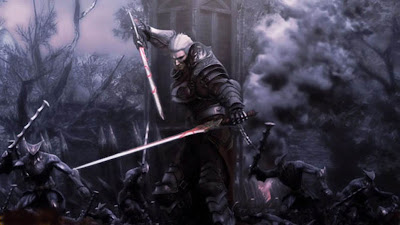
Saturday, September 25, 2010
Small Bites Only
Saturday, September 4, 2010
Duke Nukem Forever To Actually Get Released
Wednesday, August 18, 2010
There Is Only WAAAAAAGH

Announced yesterday, Retribution is a second "expandalone" for Dawn of War 2, due out in Q1 2011. Initially announced as featuring an Ork campaign as well as new units and maps for multiplayer, Bilson's comments indicate it may be more than that. It would appear that all of the races in the game are playable in the campaign, not just the Orks, and that while it is not returning to base building, he implies unit construction will be back in the campaign rather than the fixed squads of DoW2 and Chaos Rising.
Most excitingly, when asked whether there will be a new race, Bilson replies "You'll see at gamescom". Which means yes. If there wasn't, he would have made some comment about adding new units and the importance of keeping the sides balanced. I can't even hazard a guess as to what a possible new race would be, but Gamescom is already underway, so we probably won't need to wait long to find out.
I'm not so excited about the idea of Dawn of War 3 being a free-to-play, MMO style game. My impression of free-to-play titles is that they are massive time sinks with premium paid items to alleviate some of the crushing grind. One of the things I most like about DoW2 is the lack of MMO-style persistence - whether it is your 1st game or your 1000th, your units have the same stats, time (or additional money) invested in the game doesn't give you any advantage over other players aside from practice. Still, DoW3 is a long way off, and depending on the success of Company of Heroes Online, Relic might decide not to go down that route.
Monday, August 9, 2010
The Wait Is Over
I'm impressed with the layout of the single player campaign; when I read that Blizzard wanted to separate it from the multiplayer, to make it more objective based, I thought they were going to go the same route as Relic did in the campaign of Dawn of War 2 and make a series of those "dungeon crawl" missions. However, most of the levels still allow base building, but they manage to throw in an unique variable into each of the levels to change it up from the norm. In addition, they've used the disconnect from multiplayer to include a whole range of units they couldn't balance effectively for competitive game. It's a really good way of handling the campaign.
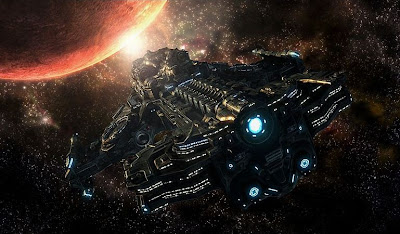
I'm not sure I'm too big a fan of the storytelling, though. Jim Raynor shifts unconvincingly between goofy and driven, the news reports it plays between missions are heavy-handed and the whole atmosphere seems a little... lightweight. It's not Mass Effect, certainly, but maybe it was never meant to be. I'm about 12 missions into the campaign, so it is probably unfair for me to pass judgement on the whole storyline yet, but I do feel it is a bit slow, that it lacks the urgency it needs. There is a simple reason for this; the game is too drawn out. Blizzard decided early on to split Starcraft 2 into 3 games, so they've had to bloat the campaign to make it full-length. There are too many side missions, and the game doesn't drive the importance of these to the main threat of the Zerg invasion. I think the campaign of Chaos Rising was only 10 or 12 missions in total, but that far into Starcraft 2 I feel like things are still building up. I'm not sure I agree with Blizzard that they had too much story to tell for just one game, I think they've just got used to doing things slowly so they can continue to sell to people.

In the campaign, the desire to get more units and move the story forward, combined with the unique aspects of most of the missions, keeps you going, but the basic gameplay itself feels like a throwback. I still believe the original Starcraft to have been the best RTS ever, in terms of how good it was for its time. It had a great setting and a strong story, but these elements are subjective, it was also revolutionary to the genre. It was probably the first RTS with completely differentiated races, going far beyond what Command & Conquer had done. By comparison, Starcraft 2 seems very conservative. It still only has 3 races, and it doesn't really have anything fundamentally different from what the original had, over 12 years ago. The genre has moved forward, but Blizzard have elected not to. They can probably argue that they didn't want to fix what wasn't broken, but I agree with a recent Penny Arcade post which stated that there is "a safety in thought and deed here that borders on cowardice." The game is brand new, after an extremely long development period, yet it already feels old in certain respects.

I haven't tried much of the multiplayer yet. My first attempt at a co-op game was crippled by lag despite having only two local players, which must have been a server-side anomaly. I've had 3 1v1 multiplayer games, in the training league which slows the game down and protects your base with barriers that need to be destroyed. The first two games I was building away steadily when a couple of Battlecruisers floated in and crippled my defenses (which was particularly annoying as I used to hate the turtle and battlecruiser swarm tactic in the first Starcraft). The third game I decided to try that same strategy for myself and just mine furiously until I could deploy battlecruisers; I would have been zealot-rushed if it wasn't for the novice map's protection of the base entrance, but eventually I did manage to build 4 or 5 battlecruisers. My opponent, however, had built almost a full screen's worth of Protoss stalkers, and they eventually overwhelmed my base. While I'm clearly still very bad at the game, in all 3 cases I felt like I was out-built rather than out-fought.

There's an impressive amount of polish in the game, as one would expect when a game takes many years and reportedly $100 million to make, but I would have liked to have seen a little more from it. Perhaps Blizzard were worried that to make too many changes would endanger the inherent "Starcraftiness" of the game. Whatever the reason, they've picked their market deliberately, and so far it seems that market is entirely satisfied. Sadly, however, I'm not sure I'm part of that market.
Sunday, July 25, 2010
X Vs Y
 This is a terrible idea, the sort of thing that would excite people who write crossover fan-fiction, and the less said about that the better. Story is never a strong point in fighting games, but it does help if they're at least thematically consistent (which is why the unavoidable Star Wars characters in Soul Calibur IV greatly detracted from the game in my opinion). The games are also mechanically incompatible, 2D and 3D fighters are very different types of games, things like projectiles, anti-air, gauge specials are not common in 3D fighters, which have more of a focus on strings, evasion and the ground game.
This is a terrible idea, the sort of thing that would excite people who write crossover fan-fiction, and the less said about that the better. Story is never a strong point in fighting games, but it does help if they're at least thematically consistent (which is why the unavoidable Star Wars characters in Soul Calibur IV greatly detracted from the game in my opinion). The games are also mechanically incompatible, 2D and 3D fighters are very different types of games, things like projectiles, anti-air, gauge specials are not common in 3D fighters, which have more of a focus on strings, evasion and the ground game.I'd actually be quite interested in a 2D Tekken, as Namco have far better character design than Capcom (as iconic as it is, the Street Fighter cast is a bit rubbish - that's why there's such a problem with "shoto-spam", most people don''t want to play anyone but Ryu and Ken), and I do enjoy 2D fighters. I don't think I'd be that keen on a 3D Street Fighter, I have bad memories of the awful Street Fighter EX series. The cross-over, however, holds very little interest to me.
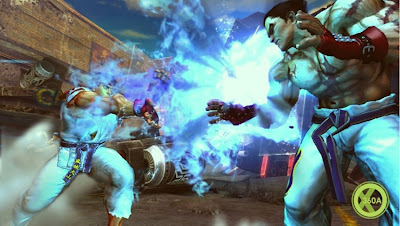 What is really sad, though, is that the two companies with the most success in fighting games, are both releasing a cross-over when the fighting genre is so starved of new games. Just look at what's on the market: Tekken 6 (7th game in the series), Soul Calibur 4 (5th game in the series), Virtua Fighter 5, Street Fighter 4 (probably between the 7th and the 15th, depending on how you count the versions), King of Fighters 12, the new Mortal Kombat will be something like the 9th in the series. Those are some big numbers. Even a newcomer like BlazBlue is only there because Arc lost the license to their own Guilty Gear games, and the similarities between BlazBlue and Guilty Gear are very evident. I'm not saying that sequels are a bad thing, the fighting genre benefits from an incremental approach because it is more about mechanics than narrative, but a little new blood wouldn't hurt.
What is really sad, though, is that the two companies with the most success in fighting games, are both releasing a cross-over when the fighting genre is so starved of new games. Just look at what's on the market: Tekken 6 (7th game in the series), Soul Calibur 4 (5th game in the series), Virtua Fighter 5, Street Fighter 4 (probably between the 7th and the 15th, depending on how you count the versions), King of Fighters 12, the new Mortal Kombat will be something like the 9th in the series. Those are some big numbers. Even a newcomer like BlazBlue is only there because Arc lost the license to their own Guilty Gear games, and the similarities between BlazBlue and Guilty Gear are very evident. I'm not saying that sequels are a bad thing, the fighting genre benefits from an incremental approach because it is more about mechanics than narrative, but a little new blood wouldn't hurt.Could you imagine if after Halo: Reach and Gears of War 3 Bungie and Epic decided to get together to make Halo vs Gears of War (because those two games have about as much in common as Street Fighter and Tekken do)? Instead, they'll (belatedly) move onto some new IP, with both companies probably continuing to make shooters, but they won't be forced to look back on themselves like the fighting genre seems to have to.
Friday, July 16, 2010
Game Room
For the umpteenth time, I am a big fan of retrogaming. For the PS2, I own copies of both Capcom classics collections, both Taito Legends compilations and the Activision Anthology, as well as the Sega Genesis Ultimate Collection and Namco Museum for the Xbox 360. In addition to frequenting arcades in my youth, I had an Atari 2600 while growing up, and my cousins had an Intellivision system, so I am familiar with all the systems being emulated. I am without a doubt the target market for this, yet it has yet to tempt me into making a purchase.

There are certainly things which Game Room does well. The idea for a single point of entry for old games rather than having them compete for space with other XBLA titles in your games library is a good one. Letting you design your own arcade, around which your friends' avatars wander, is quite neat, the emulation seems technically competent, and the addition of a Sands of Time style rewind feature is a great idea to allow those of us made soft by modern gaming to be able to get somewhere in the brutally unforgiving, often hopelessly unbalanced games of old.

However, Game Room shoots itself in the foot in several ways, the worst of which is the pricing model. Microsoft wants 240MSP (a little under R24 at current exchange rates) per game, or 400MSP (R40 or so) if you want to be able to play the game on PC or Xbox 360, which is far too much for such simple old games. It does allow you one free 10 minute game on each title, but the problem with retrogames is that, aside from a few classics, a lot of the time you only want to play them once or twice to remember what games used to be like and then try another title. This is why compilations work so well - when you are getting 30+ games for R150, it really doesn't matter if many of them have aged terribly, you can have a go at them, get your hit of nostalgia and then move on. You don't feel like you've wasted money on a poor game because within the context of the compilation, they all add to the experience, rather than having to justify a price by themselves. Being Xbox download titles, Game Room games won't discount over time, either. And where there is a game that was released as a standalone XBLA title in the past (Time Pilot and Scramble are the only two I'm aware of), they expect people to buy it again if they want to play it in Game Room. How hard would it have been to send people who purchased it originally an unlock code?
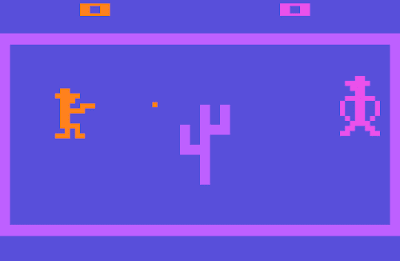
The choice of games isn't that great at the moment, either. While it does have some seminal games from the dawn of arcades (which was before even my time), such as Lunar Lander, Asteroids and Battlezone, a lot of the other games seem pretty random, and not really the best examples of classic gaming. I've discovered a lot of games I'd never seen or heard of which I quite enjoyed while playing various retro compilations, but after downloading seven game packs worth of titles for Game Room, there has yet to be a title that I thought hard about purchasing after the demo game. Maybe they plan to expand into later arcade eras (the late 80s or early 90s, perhaps) at a later stage, and with that will come more recognisable games.
You can visit friends' arcades, but to play the games they have bought costs virtual tokens (which you earn when other people visit your arcade), and this counts as demo play so it's limited to 10 minutes and your scores aren't saved for your friends to try and beat unless you have purchased the game yourself, so this feature, which could have mitigated the cost to an extent, doesn't really work very well.

I wonder then, if I'm not that taken with it, who is? I don't believe it has been a great success for Microsoft, but some people must be buying the games. I see each week on Major Nelson's LIVE activity charts that Game Room titles purchased usually collectively rank somewhere around 10th on the XBLA chart. I have no idea how many sales that actually is, but it is worth noting that all Game Room titles combined (at 240MSP each) are invariably below Castle Crashers on the chart, which costs 1200MSP and has been out for two years. In fairness, though, Castle Crashers is awesome.
Saturday, July 10, 2010
Where Everyone Knows Your Name
I read this comment on Metafilter, linked from Penny Arcade, and I have to say I found it a bit shocking. The assertion that every female player will be harassed and many of them will fear physical confrontation if it is made easier to e-stalk them would seem like scaremongering overreaction if it weren't for the scores of follow-up responses pleading with people not to belittle the problem.
I know WoW has more players than the population of many small countries, and that with such a broad spectrum of humanity online you are bound to get a fair number of maladjusted miscreants, but it is a pretty sad indictment of online game players that harassment and abuse seem almost guaranteed.
As is visible on the right hand side of the blog, I currently use my full real name as my Gamertag on Xbox Live (and Games for Windows Live, as they use the same tag). I set it up at a time where I couldn't be bothered with all the hiding behind aliases that happens on the internet, and I haven't got around to changing it. Every time I play online my name is available to the people I play against, which has never really concerned me before. It no doubt helps that I don't play any MMOs - even if I were to really piss someone off, the transience of the games I play would mean it wouldn't be worth their while to really try and grief me, they'd probably never come across me again. I have had a few insulting messages typed at me in Dawn of War 2, with one person even feeling the need to send a swearword-filled rant to me on Live after a game, but it really didn't bother me. It would probably be different if I knew I was probably going to be sharing the game with that person most of the times I wanted to play.
Trying to bring bit of accountability to people's interactions in a game is certainly a worthwhile goal; unfortunately, Blizzard's attempt with the RealID system does not appear to be a workable way of achieving it.
Friday, June 4, 2010
In Space No One Can Hear You Ruminate About Old Game Genres
One wonders, with all this goodwill for the genre in the hearts of older gamers, why they don't seem to have released a decent space-sim of either variety on any of the current generation of consoles. That's going to change, though, as it appears that Ascaron Entertainment's fairly well received 2006 space trading and combat game, Darkstar One, is being readied for release on the Xbox 360. I see Eurogamer even has a preview for it, which I haven't even read because I'm so worn out from work at the moment.
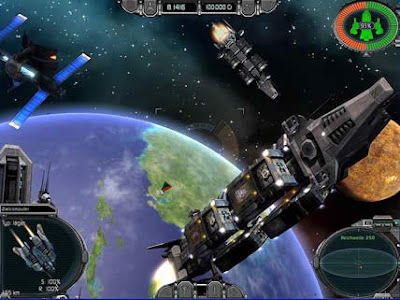
I don't really know whether the market will support this sort of game, and I don't know if Darkstar One is the best of the breed as far as modern Elite-clones go, but I am certainly happy to see someone trying to get a space-sim out into the console market. I'm going to make two predictions: it will end up with a metascore somewhere in the mid-60s, and by the end of the year you will probably be able to import it for less than £10 before shipping. And when it that happens, it may well be worth a look, if only for old times' sake.
Saturday, May 22, 2010
Pac-Man's 30th Anniversary
I'm not going to try and explain the impact Pac-Man had on gaming, that has probably been done better than I would be able to, and I'm actually too young to have played Pac-Man in the arcades. However, I spent a bit of time playing the game late last year (the XBLA version on the Namco Museum Collection), and it's remarkable how well the game still stands up. As I seem to state in a lot of these posts, I enjoy retro-gaming, but a lot of old games rely on nostalgia and a "so bad they're good" factor now. Pac-Man, on the other hand, remains a challenging, well designed game, where repeated play actually sees you improving as you develop better strategies to go with improved reflexes. For a game released in 1980, that is quite a feat.
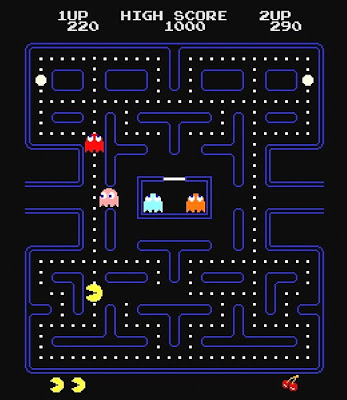 Namco have stated that they plan to release a new version of the game this year to mark the 30th anniversary. Having already made all the usual mistakes in updating old classics (trying to add storylines, making it into a 3D platformer) many, many years ago, their last Pac-Man game, 2007's Championship Edition, took the game in new directions without compromising the core of the game, so it will be interesting to see what the new one will be like. Rumours currently suggest a four-player game where Pac-Men have to eat each other as well as ghosts and dots. The new game will most likely be revealed at E3 this year.
Namco have stated that they plan to release a new version of the game this year to mark the 30th anniversary. Having already made all the usual mistakes in updating old classics (trying to add storylines, making it into a 3D platformer) many, many years ago, their last Pac-Man game, 2007's Championship Edition, took the game in new directions without compromising the core of the game, so it will be interesting to see what the new one will be like. Rumours currently suggest a four-player game where Pac-Men have to eat each other as well as ghosts and dots. The new game will most likely be revealed at E3 this year.
Sunday, May 9, 2010
The Wrath of War
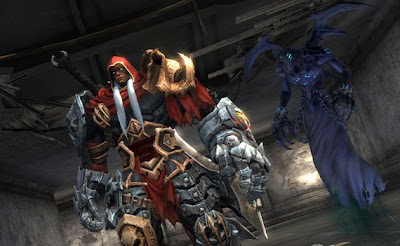
I was reminded of a Penny Arcade comic about the game (I would also recommend reading the newspost attached to it), and specifically its relationship with Dante's Inferno, a game I also included in the SHA round up and was not bowled over by the demo of. Certainly, Darksiders includes elements easily recognisable from other games, but Dante's Inferno feels like a God of War clone, like it set out with only one goal in mind. Darksiders pulls from many sources and suffuses them with its own style, it certainly doesn't come across as a copy of any one thing. Visually and thematically, it actually reminds me more of Soul Reaver than any recent game, which is certainly no bad thing.
Mechanically, it's far from perfect. The graphics are not amazing; I think, resolution aside, they would have been matched by games on the previous generation of consoles (I'm thinking Ninja Gaiden on the original Xbox and God of War on the PS2). The animation can be quite stiff and the combat is less fluid than Dante's Inferno or Bayonetta, with the combo system not seeming to have as much depth. It has a lot of charm, though. In this modern era of ruthlessly focus tested games and safe-bet sequels, Darksiders comes across as a the product of a developer who had an idea for an awesome game and just went ahead and tried to make it, which makes any shortcomings far easier to forgive.
I'm not very far in it, and it seems like quite an expansive game (sadly, for me, this is not necessarily a good thing), but so far I'm really enjoying it. I'm pleased to see that it was fairly well received critically, and I read that it sold quite well, too. I appreciate what Vigil have tried to do with the game, and I'm glad to see it has brought them success.
Thursday, April 29, 2010
Split/Second
Developed by Blackrock Studios, the company behind quad-bike racer Pure, the premise of Split/Second is that you compete in a futuristic television show, where contestants race around a track rigged with explosives. Filling your power bar by drifting, jumping or slipstreaming other cars allows you to trigger explosive power-plays, which can be range from small explosions to take out opponents to massive events which reshape an entire portion of the track.
 The HUD is attached to the back of the car, so you can still see it when the speed blur gives you tunnel vision
The HUD is attached to the back of the car, so you can still see it when the speed blur gives you tunnel visionOne of the things which got me interested in the game in the first place was that it seemed to capture some of the spirit of the early Burnout games, and that spirit is very evident in the demo. It has the same manic energy to it, the screen almost constantly in speed-blur, bits of debris flying at the camera as you hurtle around the track. Most importantly, the "holy crap" factor is very high, as you dodge explosions and wreckage, and some of the power plays are enough to make you duck or lean on the couch to try and avoid them (notable ones on the demo's airport terminal track involve an air-traffic control tower falling into the track, and a plane crash-landing onto a runway which you are racing down at the time).
With only one car, one track and three laps, the demo seems quite light, and without upgrades or even needing to brake for corners, the full game might lack depth compared to, say, the heavyweight auto fetishism of Forza 3, but I don't really mind. In some ways it is not-unwelcome throwback to the days when games were just about the thrill of the action, before RPG progression wormed its way into every genre. Besides, longevity is hardly the top of my list of attributes I want a game to have nowadays.
So I'm definitely going to buy the game... when I can import it for £20. That seems quite harsh on a game which I think looks pretty good, but it seems like it will discount fairly quickly, and I'm currently not seeing the point of paying full price for a game I probably won't even get to play before the price drops anyway. Split/Second is out on the 21st of May.
Saturday, April 17, 2010
Attitude for Gains: Now with added spam
Friday, April 16, 2010
Everything Old is New Again
First up was news of EA and Starbreeze registering "Syndicate" trademarks. It had been rumoured for a while that EA (who own the Syndicate IP since they bought and destroyed Bullfrog) and The Darkness / Chronicles of Riddick developer Starbreeze were working on a new Syndicate game, but I feared when reports surfaced that a game they were developing was cancelled that it was going to be stillborn. Now it appears that they actually canned a Bourne Identity game (which nobody cares about), in another case of EA making good now that ActiBlizz has replaced them as the evil empire of the gaming industry. For those of you too young to remember, Syndicate was one of Bullfrog's many groundbreaking games, an isometric action-strategy game set in a surprisingly fully realised (for 1993) cyberpunk environment. Looking at the screenshots does provide a bit of a reminder as to how long ago 1993 was, though.

The other item of news involved 2K Games announcing that Bioshock 2 developers 2K Marin were making a new X-Com game (it has now been explained that it is actually 2K Australia developing the game, but this doesn't mean much to me. 2K Games really needs to let its studios have more interesting names). Released 1994, the first X-Com game (you'd probably be more familiar with the European title of UFO: Enemy Unknown) was a landmark title of the late DOS gaming era, combining base building, research and resource management, a real-time global map and a turn based, tactical combat system for individual battles. It wasn't much to look at (even by 1994 standards), and the individual mechanics weren't always that well resolved (the tactical elements of the turn based combat, for example, were notably inferior to the first Jagged Alliance game), but it had such breadth of ambition, and so many good ideas that it felt massively ahead of its time.

While I'm excited to see these classic names return to gaming, I am a little concerned that the rebirths (they're doubtlessly going to be too different to be called remakes) of these series might not retain much of the spirit of the old games, the things which made them so great when they were first released. Chief amongst these worries is the fact that both games, where both original versions were viewed from an isometric third person perspective, are likely to be remade as first person shooters. This is merely speculation for the new Syndicate game, based on the nature of Starbreeze's recent releases, but has been confirmed for the new X-Com game. Hopefully the game will still include the macro-level strategy of the original, but I think that putting the player in charge of an individual soldier, even with some tactical controls, will change the feel of the game quite a lot, as will the shift to real-time from turn-based combat. Similarly, I think making the new Syndicate game a first person shooter will also lose something, and make it feel far more generic. Still, at least it doesn't sound like they're going to make it a team-based online FPS, like how Microsoft squandered the Shadowrun IP.
It's far too early for anything but conjecture on these games, neither of which have even had a release window announced, but hearing that these two classics were coming back certainly gave me a brief flash of nostalgic joy.
Wednesday, March 31, 2010
Finish Him?
There are four major players left in the fighting game genre, being Sega, Namco, Capcom and Tecmo, none of which would need THQ to publish any of their games, as all are either big players in their own right, or have links with other publishers in Western markets. Minor players in the fighting genre like Arc Systems and SNK-Playmore wouldn't be worth announcing, as their appeal is very niche.
So what does that leave? In my mind, there is only one option: Mortal Kombat. With Midway having disintegrated after declaring bankruptcy, the MK team would need a new publisher, and Ed Boon and co had said that they had salvaged their IP from the wreckage of Midway. By my count, a new game would be Mortal Kombat 9 (that's assuming you don't count things like Ultimate MK3, Mortal Kombat Trilogy or Mortal Kombat Gold as titles in their own right), although it is unlikely to be called that, since the games haven't used numbers in their titles since Mortal Kombat 4.
So, does Mortal Kombat still matter? In the larger scheme of things, no: even with the slight resurgence in fighting games brought on by the huge success of Street Fighter IV, another Mortal Kombat game is unlikely to get people too excited. On a personal level, I had played every Mortal Kombat game up to Deception (MK6, technically), but when Armageddon (MK7) came out Mortal Kombat apathy had set in too deep for me to get it, even when it became really cheap. I didn't even consider MK vs DC Universe (MK8) because the idea seemed so awful.
However, critical reception of MK vs DC Universe wasn't too bad, and even though all the footage I saw of the game seemed to suggest it was as stilted and awkward as the Mortal Kombat games had always been since moving to three dimensions, maybe the work they were supposedly doing on the fighting engine did actually pay some dividends. I still do have a slightly irrational fondness for the series from my youth, and an all-new, proper Mortal Kombat game (not another wretched cross-over) does still pique my interest.
I could be way off the mark about the announcement, though. Roll on E3, then.
Sunday, March 28, 2010
Hazard Time
Eat Lead tells the story of made-up 80's action game hero Matt Hazard's return to "next-generation" gaming, a set-up designed to allow Vicious Cycle to parody various elements of game design. At its core is a mediocre cover-based shooter in the style of Gears of War, as Matt fights his way through such gaming constants as warehouses, docks, trainyards, cruise ships and mansions, battling, amongst others, gangsters, cowboys, Russian soldiers, zombies, 2D Nazi sprites and scantily clad, sub-machine gun wielding women with hilariously overdone American, British and Russian accents.
It's not the most impressive game technologically, although the character animation is fine and the ragdoll mechanics quite satisfying. Some of the ropey environments actually worked quite well by reminding me of early Rainbow Six games and even Duke Nukem 3D at times. However, the game can be punishingly difficult at times, and being caught in the open can mean almost instant death, which is something that you are far more willing to accept from a more polished title. With a game like this you are often inclined to blame the sometimes inaccurate cover mechanics, poor set-piece design (there is a level where you get one-shot killed by a sniper if you leave cover for more than two seconds, which just wasn't fun to play) and perhaps a lack of play-testing.
Judged solely on game mechanics the game was always going to struggle, but I don't think it is as bad as some reviewers made it out to be, and I really enjoyed the humour in the game. I noted down quite a number of things that made me chuckle during the game, but I'm not going to just list them here, as jokes are never as funny when you explain them, and I want to avoid a "I guess you had to be there" situation. Some of the humour works better than others; there is a power-armoured cook called the Master Chef who serves no purpose but as a weak name gag, but there is also an orbital laser weapon in one of the boss fights called the Maul of Mourning, which I thought was quite clever, and there is a brilliant encounter with a JRPG boss who speaks in text boxes (forcing Matt to push an on-screen button before he will say any more, even though Matt is trying to talk to him with a normal voice-over), and has the damage done to him shown numerically whenever you shoot him in typical JRPG style. Matt Hazard is voiced by Will Arnett (who played Gob in Arrested Development), who is well-suited to the role; there were a couple of dead-pan inside jokes which were so unexpected that they caused me to laugh out loud when I heard them.
I did appreciate that the game was fairly short, I managed to finish it in five playing sessions (it still took me nearly three weeks to get those in, though). This sounds like a very backhanded compliment, but with my gaming time fairly constrained I don't always want to play a 40+ hour epic, I am perfectly happy if a game is over quickly as long as I enjoy the experience while it lasts.
So would I recommend the game? While I certainly enjoyed it, I'm not sure I would. It's a game that you probably have to be favourably disposed towards to enjoy fully, and might be something of an acquired taste.
Despite the poor sales of the game (evidenced by the incredibly low price it is now available for), Vicious Cycle did manage to develop a sequel, albeit a lower budget one. Matt Hazard: Blood Bath & Beyond, a 2D side-scrolling shooter in the vein of Contra, is currently available on XBLA and PSN, and has been slightly better received. I'm actually keen to give it a try, although maybe only sometime in the next few months.
Tuesday, March 9, 2010
Merciful Indifference
When I took time to consider it, there are actually some really big titles coming out soon, or in the later parts of the year. There's a new Final Fantasy game out now, something which is a huge event in the lives of many gamers. I'm not one of them, however, there are four or five other RPGs I'd want to play first, and even after that I'm not sure I'm that keen on the bizarre Japanese combat scenarios or the fact that the cast seems like it was designed by a cosplay focus group at an Anime convention.
Later in the year, Starcraft 2 will come out, no doubt destroying productivity in South Korea for at least a week. In the Western world, too, there are legions of PC gamers foaming at the mouth at the prospect of their 12 year wait for a sequel to one of the best RTS games ever being nearly at an end. Despite this, I'm not that excited about it. I will probably buy the game, and I'm sure it will be polished and enjoyable as Blizzard games always are, but from what I've seen of it (admittedly not that much, as I haven't been following the betas that closely) it looks like a throwback to the old style of RTS games when the genre has moved on, like Blizzard knew they could not risk alienating the South Korean pro-gamers by messing with the formula. For some, a high-res Starcraft will be all they ever wanted, but I'm also a little concerned that the Blizzard of old is gone, the key staff having moved to different companies over the years as Blizzard became World of Warcraft Inc. It's probably worth remembering that the last RTS Blizzard released was the relatively underwhelming Warcraft III. I have over 800 ranked games of Dawn of War II to my name - I highly doubt I will get anywhere near that on Battle.net.
There are a couple of PS3 games I'm interested in: Heavy Rain, while derided by some as a giant set of quick time events masquerading as a game, sounds like a fascinating new direction for the graphic adventure to me, and is something I'd like to try. God of War III comes out in the next few weeks, too, and there is pretty much no way that it could not be awesome. However, my enthusiasm for these games is damped somewhat by the fact that I don't own a PS3, and I'm not actually in a hurry to buy one so I can have more games I might not get around to playing.
That's not to say that there aren't any Xbox games I'm looking forward to, but none to the extent of counting the days until their release. Black Rock Studio's upcoming racer Split/Second looks very promising, capturing the spirit of the earlier Burnout games, and its blend of breakneck speeds and track-altering pyrotechnics would make it a good foil to the more technical, realistic challenge of Forza 3. Later in the year Halo: Reach is coming out, Bungie's swan-song for the Halo universe. The launch of a new Halo game isn't as big a deal as it was before, I didn't even pick up a copy of ODST, but I am actually more intrigued by something being the last in a series, rather than just another sequel.
I may sound like I'm complaining about the lack of excitement I have over upcoming releases, but that's not the case, I'm actually quite content to be indifferent, as my backlog has built up to the point that I probably don't really need to buy another game for the rest of the year anyway, and a little time to chip away at it will be greatly appreciated.
Sunday, February 28, 2010
In Service Of The Creed
Sunday, January 24, 2010
Familiarity Breeds Contempt
Friday, January 8, 2010
The Boon and the Bane of Metacritic
 The problem with Metacritic is that some people take it way too seriously. I'm not sure if the system wars (I hesitate to use the term console wars, because they probably go all the way back to Spectrum vs Amstrad) were always this belligerent, and it's just so much more noticeable due to the internet granting every deranged lunatic a pulpit from which to declare how fiercely invested he is in his gaming platform of choice, but it seems that for many, the enjoyment of gaming is entirely secondary to the quest to prove that any other system, and all the games for it, are rubbish. PS3 owners are required to belittle Gears of War, Xbox owners to dismiss Killzone 2, and PC diehards have to deride anything that is console exclusive.
The problem with Metacritic is that some people take it way too seriously. I'm not sure if the system wars (I hesitate to use the term console wars, because they probably go all the way back to Spectrum vs Amstrad) were always this belligerent, and it's just so much more noticeable due to the internet granting every deranged lunatic a pulpit from which to declare how fiercely invested he is in his gaming platform of choice, but it seems that for many, the enjoyment of gaming is entirely secondary to the quest to prove that any other system, and all the games for it, are rubbish. PS3 owners are required to belittle Gears of War, Xbox owners to dismiss Killzone 2, and PC diehards have to deride anything that is console exclusive. Metacritic, by reducing the critical reception of every game to a percentile value, allows for the explicit comparison of these games. It's not perfect as it can struggle to equate different sites' reviewing methods (a 6/10 from Eurogamer is probably a better score than a 7.8 from IGN), and it does allow completely different games to be compared on the same scale (For example, are you aware that the Xbox version of Peggle is a much better game than Assassin's Creed?), but the system is about as objective as it could be, and it has become the de facto standard for measuring games.
Metacritic, by reducing the critical reception of every game to a percentile value, allows for the explicit comparison of these games. It's not perfect as it can struggle to equate different sites' reviewing methods (a 6/10 from Eurogamer is probably a better score than a 7.8 from IGN), and it does allow completely different games to be compared on the same scale (For example, are you aware that the Xbox version of Peggle is a much better game than Assassin's Creed?), but the system is about as objective as it could be, and it has become the de facto standard for measuring games.This causes an issue, especially in the context of the console war, because a bad (or even not stellar) review can damage a games' metascore, especially those with metascores in the 90s, where every less than perfect score drags the metascore lower. I recall the huge uproar when Eurogamer gave Gears of War 8/10, and I recall the comments thread had more than 1200 posts when they dared to give Metal Gear Solid 4 a similarly "low" score. I have seen some ridiculous comments on review threads, such as people saying "well, the game has a metascore of 78 at the moment, so your score of 6/10 is clearly wrong", as if they believe that the metascore should determine reviews, rather than the reviews determining the metascore.
 I suppose that vocal idiots are a problem endemic to the internet (warning, link contains bad language), and we shouldn't let this detract from the highly useful information that Metacritic aggregates.
I suppose that vocal idiots are a problem endemic to the internet (warning, link contains bad language), and we shouldn't let this detract from the highly useful information that Metacritic aggregates.Some useless facts: Grand Theft Auto IV has the highest metascore of any current generation game at 98. At 97, Super Mario Galaxy for the Wii has the highest metascore of a game exclusive to a single console, followed by Uncharted 2 on the PS3 with 96. The highest rated Xbox 360 exclusive is Gears of War with 94.
Saturday, January 2, 2010
Go To Hell
I downloaded the Dante's Inferno demo that was released on Christmas Eve, but I only had the chance to play it a few days ago. I mentioned Dante's Inferno in my stylish hard action roundup a few weeks back, noting that it could be interpreted as a fairly cynical attempt to cash in God of War 3's PS3 exclusivity. Well, my overriding impression from the demo is how blatant a clone of God of War the game is, and I can't help but think this is a bit of a mistake on the part of developers Visceral Games.

The demo opens with a tutorial battle against some basic human foes, while Dante is still on one of the Crusades. The light/heavy attack combinations, and the right stick evasion in particular, feel exactly like God of War (you could argue that all games of this sort will have a somewhat similar control scheme, but I think it is telling that I was immediately reminded of God of War, rather than the last game of this genre I had played, which would be Ninja Gaiden 2). After completing this battle Dante is stabbed in the back, and as he is dying Death arrives to claim him, saying how his actions have damned him and his family. Dante refuses to accept this, and ends up fighting and killing Death with his own scythe, which then becomes Dante's standard weapon. It's exactly the sort of thing you'd expect to see Kratos doing, but the problem is that Dante's Inferno's fallen crusader doesn't radiate the sort of violence that God of War's ghost of Sparta does. Maybe it's unfair to accuse the game of a lack of character based on a short demo, but even the opening scene of God of War was enough to establish that Kratos was a very bad man, and Dante's Inferno doesn't do that. God of War comparisons are again unavoidable when Dante arrives back at his villa to find his wife murdered (although it looks far more like the scene from the movie Gladiator). From then on, all Hell breaks loose (literally) as Dante attempts to follow his wife into Hell to free her.
The game certainly looks good, the graphics looking much sharper than what I remember of God of War 1 and 2 (which is to be expected given the hardware the games are running on), and it apparently all moves along at a constant 60 frames per second. It has some suitably epic moments, such as when the front wall of Dante's chapel falls away to reveal Hell burning beneath him. The demo only takes Dante as far as the gates of Hell, with the only boss battle being the early one against Death, and I have no doubt there is more shock and awe to come (I recall reading previews stating how gruesome the ends that some of the bosses meet are). The teaser images for the full game at the end of the demo show several scenes of Hell, all mangled bodies and twisted flesh and rivers of blood. It appears to be unrelentingly unpleasant stuff (which, I suppose, you would expect given the nature of the game). Perhaps there will be more variety across the nine levels of Hell in the final game, but I feel that this is an area where Christian mythology lacks the breadth of the Greek mythology that God of War draws upon. Visceral Games are probably determined to be more hardcore than God of War, and they probably feel that all the unpleasant imagery is achieving this, but I'm not so sure of it as a design decision. Another example of this would be all the gratuitous nipple shots of Beatrice, Dante's wife, which aren't really necessary, but it really seems like the developers thought "well, God of War had breasts in it, we'd better have some in our game, too".

I haven't even touched on the matter of the source material; I haven't read the Divine Comedy, so I can't provide examples of how the game is not true to it, but I highly doubt that Dante, accompanied by the ghost of the poet Vergil, hacks his way through the nine levels of Hell, eviscerating everything that he crosses paths with. It seems like EA and Visceral are stretching the license a bit too far, essentially just using it for name recognition.
As of writing, there are no early reviews for the game on Metacritic, so my only idea of the critical opinion of the game comes from a few previews, which were pretty positive, but previews always are. My impression from the demo is not that it will be bad game, in fact I think it will be quite a polished action game with some impressive set pieces and brutal action, but I do feel that it would probably have been better if the developers had tried to make their own game, rather than shoehorning their version of God of War into a license that is only tangentially suitable for it.
Dante's Inferno is out on 12 February 2010. I may well end up playing it, but I won't be rushing out to buy a copy at launch.

